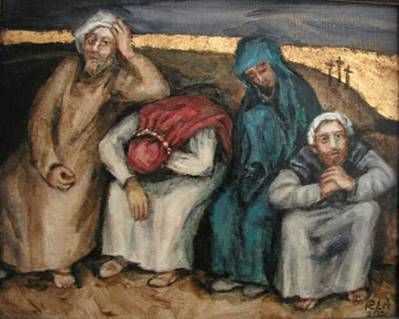Påskafton: Stuck in the middle
Kategori: Kristen tro
Idag, på påskafton, skriver Jae Sung Kim på bloggen. Jae Sung är en teologistuderande familjefader som gillar att ha på sig en mössa inomhus och att spela basket ("shoot some hoops.")
Maundy Thursday, Good Friday and Easter Sunday… These are the days we are familiar with when it comes to Easter weekend. Many churches will have a schedule to celebrate these days with their specific liturgies. Maybe a quiet communion service on Thursday, a somber meeting on Friday focusing on the crucifixion, and finish the weekend with a festive celebration of Jesus’ resurrection on Sunday morning.
But today is Saturday and we don’t quite know what to do with it. Is it to be a somber extension of Good Friday? Or is it a hopeful anticipation of Jesus’ resurrection on Sunday? The Gospels are not very helpful in shedding light on the meaning of this day either. There’s a sudden vacuum in the passion narrative following Friday and just as abruptly the story continues with, “When the sabbath was over…” or “Early on the first day of the week…” But what happened on that Sabbath?
To add to the ambiguity of the meaning of today, we’ve* had little or no tradition to observe this day together as church. We gather on Good Friday and Easter Sunday as we remember and share in the meaning and significance of these two days together, but on Saturday, we are left alone to ponder, or not to ponder, on its meaning. The day becomes this unclear and undefined period squeezed between two of the most thought about and significant events in the history of the world: Jesus’ death and resurrection.
Anthropology describes this kind of in-between period as liminality. It’s the middle part of a ritual where participants feel lost and disoriented from no longer being in the same stage as before the ritual began but not yet having completed the process to enter the next stage. People don’t know what do to because they can no longer relate to the world as it used to be, but neither are they ready to step into the next defined stage of life. And that’s kind of where we are today; we are lost in the liminal period between the commemoration of Jesus’ death and the celebration of his resurrection.
Perhaps liminality is also an accurate term to describe the state the disciples were in on that historical Saturday. Their lives had been forever changed in their meeting with Jesus. They left their prior lives and loyalties to follow him and devoted themselves to his life and teaching. With him they got to experience the dawn of a new reality: heaven breaking into the world around them. In Jesus they found the hope and promise of God’s immanent kingdom. But now their beloved teacher had been captured, killed and buried. Life as they had come to know and hoped for came to an abrupt and crushing end. Their world was turned upside down and the uncertainty of tomorrow was looming over them. What were they to do?
A tragic paradox of that Saturday is that the disciples were probably gathered for the Sabbath. Israel was told to rest on this day and set it apart for God. In trusting and relying on God’s provision for that day, they were to realize their intrinsic dependence on God and His faithfulness to them. It was also to be a day to remember God’s deliverance of Israel from slavery, to honor the many ways in which God provided for their salvation in the face of certain demise. Restoration and peace were to be markers of the Sabbath. But on this particular Sabbath, grief and despair must have weighed heavily on the hearts and minds of the disciples. How could they rest in God’s faithfulness in such a time? How could they remember God’s deliverance when the one who inspired and carried their hope now lay dead sealed in a tomb? Hopelessness and strain trembled under the quiet of the Sabbath.
Once again the Sabbath serves to illustrate the limits of our abilities and the provision of God despite those inabilities. Despite Jesus’ own public predictions about his resurrection, it’s clear from the Gospels that none of the disciples expected him to be raised from the dead the following day. They simply could not fathom in the shadow of the crucifixion and dealing with the certainty of Jesus’ death, that God could somehow in someway still provide life. But while the disciples were settling in their despair, God was about to provide the greatest deliverance of all.
The shocking news of Easter Sunday proclaims the power of God to work beyond what we are capable of imagining. It’s a reminder that our faith relies not in our ability to believe but on knowing the God who can and has done exceedingly more than what we can hope for or imagine. Maybe the liminality of today should be something to be embraced. The feeling of not really knowing, the sense of uncertainty and uneasiness may be an appropriate way to acknowledge both our limitations and our reliance on God. Perhaps making room in our Easter observation for a little disorientation is a helpful reminder that we can find rest in God’s sovereign power to orchestrate the amazing Easter story.

* Sorry, I’m really just speaking on my own church tradition here. I am aware that other traditions do celebrate Holy Saturday together. My bad.

